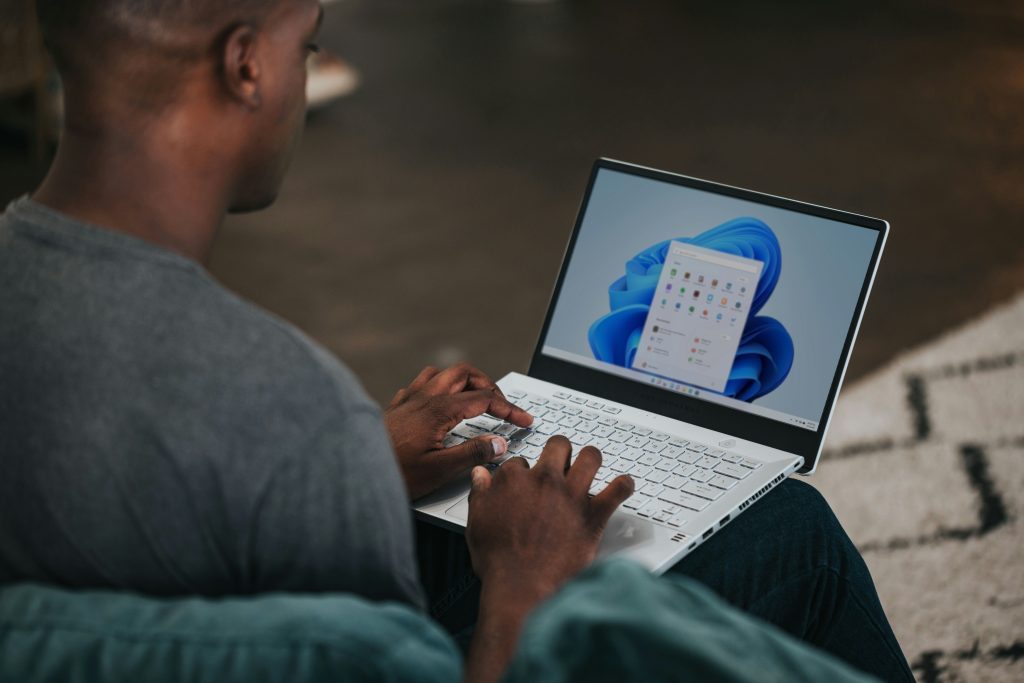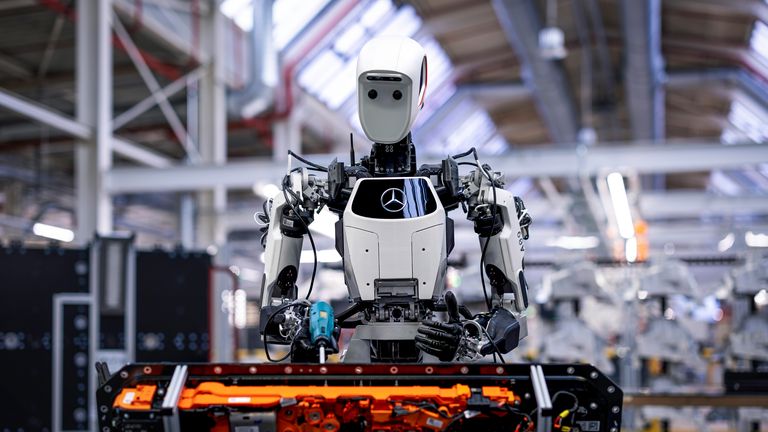Discover Microsoft’s Cutting-Edge Copilot+ PCs with Next-Level AI Innovations
Microsoft Launches New AI-Enabled Copilot+ PCs
Microsoft has introduced a groundbreaking line of personal computers equipped with advanced AI capabilities, affirming its commitment to embracing innovative technology across its product offerings. This new series not only enhances Microsoft’s competitive edge but also directly positions it against AI-driven advancements from industry leaders such as Alphabet and Apple.
During a recent event at the company’s headquarters in Redmond, Washington, CEO Satya Nadella presented the Copilot+ PCs. Developed in partnership with manufacturers like Acer and Asustek, these PCs come as Microsoft’s stock prices hover near record highs, supported by Wall Street’s optimistic outlook on how AI could bolster profits for major tech corporations. The Copilot+ PCs are designed to handle more AI tasks locally, which diminishes the need for cloud-based data centers. Starting at a price point of $1,000, these devices are set to begin shipping on June 18, and comprise laptops from well-known brands such as Dell Technologies, HP, and Samsung, alongside two models from Microsoft itself.
Technical Innovations and Product Range
The Surface Laptop, Microsoft’s first Copilot+ model, features a Qualcomm Snapdragon X series chipset. This incorporates an embedded AI accelerator that can execute up to 45 tera operations per second (TOPS). Available in sizes of 13.5 inches and 15 inches, these laptops support up to 64 gigabytes of RAM and 1 terabyte of flash storage.
Complementing the Surface Laptop is the redesigned Copilot+ version of the Surface Pro, a versatile two-in-one device with a 10.6-inch display that transforms into a laptop thanks to its detachable keyboard, known as the Flex Keyboard. This keyboard also serves as a wireless connector and stylus charger for the Surface Pro. Both devices are powered by the Snapdragon X processor, with options featuring up to 32 gigabytes of RAM and one terabyte of storage. Upscale models offer an OLED display for superior visual performance.
Unique Features of the Copilot+ Series
A notable aspect of the Copilot+ lineup is the “Recall” feature, which logs all user activities—from browsing the web to voice chats—and stores this information locally. This functionality provides users with a searchable history, easily accessible to revisit previous activities, even months down the line. Yusuf Mehdi, head of consumer marketing at Microsoft, projected at the launch event that the company aims to sell 50 million AI PCs in the next year. He highlighted that the enhanced capabilities of AI assistants working directly on these PCs create a compelling reason for consumers considering an upgrade.
Market Challenges and Outlook
Despite witnessing a 15% decline in global PC shipments last year, as reported by Gartner, Microsoft remains optimistic about the market potential for its Copilot+ PCs. Analyst Ben Bajarin from Creative Strategies noted, “People just need to be convinced that the device experience alone justifies this entirely new category of Copilot+ machines.” Microsoft’s introduction echoes Intel’s 2011 “Ultrabook” strategy aimed at competing with Apple’s MacBook Air, indicating a fresh attempt to redefine the lightweight Windows laptop segment.
Furthermore, Microsoft has announced plans to integrate GPT-4o, the newest iteration from OpenAI’s ChatGPT, into its Copilot. The forthcoming series of Surface Pro tablets and Surface Laptops will also feature Qualcomm chips based on designs from Arm Holdings, implementing innovative Prism technology to adapt software made for Intel and AMD processors for optimal performance on Arm systems. In a recent demonstration, Microsoft showcased how its new devices, using Adobe photo editing software, exceeded the performance of an Apple device, just weeks after Apple announced a new AI-focused chip for its future laptops.
Amidst stiff competition in the traditional PC arena, Microsoft is at the forefront of incorporating the latest AI trends into its products. This strategic direction, propelled by its collaboration with OpenAI, aims to establish a dominant position in the rapidly evolving AI landscape, challenging competitors like Alphabet. Recently, both OpenAI and Google have introduced new AI technologies, further intensifying the race.
Recent advancements in AI technology are enhancing real-time, voice-responsive interactions, creating new benchmarks for voice assistants. Concurrently, manufacturers of Windows PCs are facing heightened competition from Apple. The latter’s proprietary Arm-based chips have set new standards for performance and battery life.
If you’re interested in gaining insights from industry leaders about AI and big data, consider attending the AI & Big Data Expo. This comprehensive event will take place in Amsterdam, California, and London. It is co-located with several other significant events, including the Intelligent Automation Conference, BlockX, Digital Transformation Week, and Cyber Security & Cloud Expo.
For more information on upcoming enterprise technology events and webinars, you can explore additional resources powered by TechForge.
The significance of machine learning in improving the security of cloud-native containers is becoming increasingly prominent, with numerous interested readers (40,428 views).
In the realms of Artificial Intelligence, Finance, and Logistics, innovative machine learning applications are revolutionizing business practices (14,247 views).
In a concerning development, AI and bots have been allegedly utilized to illegitimately inflate music streaming numbers (12,093 views).
On the topic of Artificial Intelligence and Space, a partnership with outsourced developers presents various advantages (10,384 views).
Latest Articles
Applications in artificial intelligence (AI) continue to evolve, influencing various sectors, including chatbots and virtual assistants. Recent developments have seen major legal actions, such as Reddit’s lawsuit against Anthropic for alleged data scraping, raising important discussions about data ethics.
Enterprise leaders are increasingly focusing on the return on investment (ROI) from AI deployment. Strategies now prioritize security and governance to ensure responsible machine learning practices. The shift in perspective underlines the transition from merely enabling technologies to leveraging them for strategic leadership in organizations.
As the landscape of AI continues to expand, it is crucial for companies to navigate the complexities of legislation and societal impacts. Incorporating AI responsibly stands at the forefront of challenges as organizations strive to enhance operational efficiency while adhering to ethical guidelines.
Here is a comprehensive list of countries and territories around the world:
– Caledonia
– New Zealand
– Nicaragua
– Niger
– Nigeria
– Niue
– Norfolk Island
– North Macedonia
– Northern Mariana Islands
– Norway
– Oman
– Pakistan
– Palau
– Palestine, State of
– Panama
– Papua New Guinea
– Paraguay
– Peru
– Philippines
– Pitcairn
– Poland
– Portugal
– Puerto Rico
– Qatar
– Romania
– Russian Federation
– Rwanda
– Réunion
– Saint Barthélemy
– Saint Helena, Ascension and Tristan da Cunha
– Saint Kitts and Nevis
– Saint Lucia
– Saint Martin
– Saint Pierre and Miquelon
– Saint Vincent and the Grenadines
– Samoa
– San Marino
– Sao Tome and Principe
– Saudi Arabia
– Senegal
– Serbia
– Seychelles
– Sierra Leone
– Singapore
– Sint Maarten
– Slovakia
– Slovenia
– Solomon Islands
– Somalia
– South Africa
– South Georgia and the South Sandwich Islands
– South Sudan
– Spain
– Sri Lanka
– Sudan
– Suriname
– Svalbard and Jan Mayen
– Sweden
– Switzerland
– Syria Arab Republic
– Taiwan
– Tajikistan
– Tanzania, the United Republic of
– Thailand
– Timor-Leste
– Togo
– Tokelau
– Tonga
– Trinidad and Tobago
– Tunisia
– Turkmenistan
– Turks and Caicos Islands
– Tuvalu
– Türkiye
– US Minor Outlying Islands
– Uganda
– Ukraine
– United Arab Emirates
– United Kingdom
– United States
– Uruguay
– Uzbekistan
– Vanuatu
– Venezuela
– Viet Nam
– Virgin Islands, British
– Virgin Islands, U.S.
– Wallis and Futuna
– Western Sahara
– Yemen
– Zambia
– Zimbabwe
– Åland Islands







